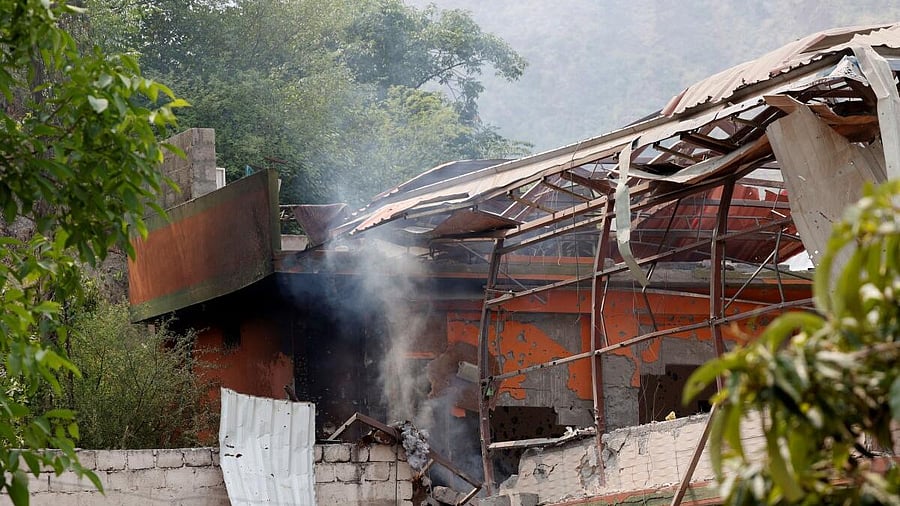
Smoke rises from a house after it was hit by an Indian strike in Muzaffarabad in PoK.
Credit: Reuters Photo
New Delhi: Prime Minister Narendra Modi’s government decided to carry out the “Operation Sindoor” not only in response to the April 22 carnage in Jammu and Kashmir, but also in view of the intelligence reports about the possibility of terrorist organisations based in Pakistan and areas under the control of Pakistan planning more such attacks in India.
“India exercised its right to respond and pre-empt as well as deter more such cross-border attacks. These actions were measured, non-escalatory, proportionate, and responsible. They focused on dismantling the terrorist infrastructure and disabling terrorists likely to be sent across to India,” Foreign Secretary Vikram Misri said.
The Resistance Force (TRF), linked to the Pakistan-based anti-India terror organisation Lashkar-e-Tayyiba, claimed responsibility for the killing of 26 people at Baisaran near Pahalgam in J&K. The investigation into the latest terrorist attack in India brought out “communication nodes” of terrorists “in and to Pakistan”, Misri said, while briefing media-persons about the rationale of launching the ‘Operation Sindoor’.
He said that the attacks had been carried out by “Pakistani and Pakistan-trained terrorists” and more such strikes had been planned by anti-India terrorist organisations based in Pakistan.
“Our intelligence monitoring of terrorist modules based in Pakistan indicated that further attacks against India were impending. There was thus a compulsion both to deter and to pre-empt,” Misri said while briefing journalists about the overnight operations by the Indian Army and the Indian Air Forces targeting the terrorist camps both across the India-Pakistan Line of Control as well as across the undisputed stretch of the border between the two nations.
Misri noted that the TRF, which claimed responsibility for the attack, was a front of the LeT, designated by the United Nations as an organisation linked to the global terrorist network. India had given inputs about the TRF in the half-yearly reports it submitted to the monitoring team of the UN's 1267 Sanctions Committee in May and November 2024, pointing out its role as a cover for terrorist organisations based in Pakistan, said the foreign secretary.
The 1267 Sanctions Committee of the Security Council oversees the implementation of the UN sanctions – assets freeze, travel ban and arms embargo – against individuals and entities associated with Al-Qaida, ISIL, or the Taliban.
Though the LeT came under the UN sanctions in May 2005, it continued to orchestrate attacks in India from Pakistan. It plotted and perpetrated many attacks, including the November 26-28, 2008, carnage in Mumbai, killing 166 people and leaving many others injured.
Misri said that New Delhi had also informed the monitoring team of the 1267 sanctions panel of the UN in December 2023 that the LeT and the Jaish-e-Mohammad (JeM), another anti-India terrorist organisation based in Pakistan, had been operating through small terror groups such as the TRF. “Pakistan's pressure to remove references to TRF in the April 25 UN Security Council press statement is notable in this regard,” he said.
China, one of the five permanent members of the UNSC, helped Pakistan, a non-permanent member, water down the council’s April 25 statement on the latest carnage in J&K, removing reference to the role of the TRF.
Not only did the probe agencies find the communication nodes of terrorists in and to Pakistan, but the claims made by The Resistance Front and the reposting of its posts on social media platforms by the known social media handles of the Lashkar-e-Taiba also speak for themselves, Misri told journalists on Wednesday.
“Identification of the attackers based on eyewitness accounts, as well as other information available to law enforcement agencies, has also progressed. Our intelligence has developed an accurate picture of the planners and backers of this team,” the foreign secretary said, giving details of how India decided to target the terrorist camps in Pakistan and areas under the control of Pakistan.
The features of the April 22 attack also tie in with Pakistan's long track record of perpetrating cross-border terror in India, which is well documented and beyond question. Pakistan also has a well-deserved reputation as a haven for terrorists from around the world, with internationally proscribed terrorists enjoying impunity there, said Misri. “In addition, Pakistan has been known for wilfully misleading the world and international forums, such as the Financial Action Task Force, on this issue.”
Misri cited the example of Sajid Mir, a Pakistan Army regular, who later turned into a LeT commander. The United States designated him as a terrorist. Mir was involved in planning the 26/11 terrorist strikes in Mumbai and was in touch with the terrorists from the ‘control room’ the LeT had set up in Karachi. Islamabad first refused to acknowledge his existence and then claimed that he had died. But Mir was arrested in Pakistan in 2022 in connection with a terror financing case when the government of the country was desperately trying to get itself removed from the blacklist of the FATF.
“The Sajid Mir case, in which this terrorist was declared dead and then, in response to international pressure, brought back to life, found alive and arrested, is the most glaring example (of Pakistan misleading the world),” said the foreign secretary.
He said that Pakistan had not taken any “demonstrable step” to take action against the terrorist infrastructure on its territory or territory under its control, even as a fortnight passed after the latest terror attack in India. “Instead, all it has indulged in are denials and allegations,” he said, explaining why New Delhi decided to launch “Operation Sindoor” to bring to justice the terrorists who had carried out the April 22 attack in J&K.
